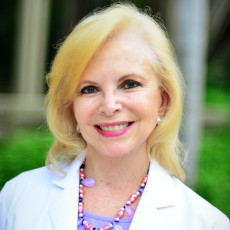 We asked Dana Wallace, MD, FACAAI, past president of the College (2010-2011), to comment on how our organization has changed in recent years and to share her advice to other women who’d like to get more involved in leading the College forward.
We asked Dana Wallace, MD, FACAAI, past president of the College (2010-2011), to comment on how our organization has changed in recent years and to share her advice to other women who’d like to get more involved in leading the College forward.
What were some of the reasons you got involved in the work of the College?
I started attending ACAAI annual meetings during my fellowship and continued to attend yearly after starting my private practice. I found the lectures, workshops and interaction with colleagues both beneficial and enjoyable. But, as a clinician, I was not sure what I had to contribute compared to academic allergists. It took a mentor (who happened to be male) to urge me to get involved—first in a committee (volunteering to be one of the worker bees) and then presenting at a symposium – I think the last day of the meeting (when there were fewer people). For that first lecture, I was so nervous, I rehearsed for days before going to the meeting and hardly slept the night before. I was shaking when I got up to speak, but was able to gain composure and present a well-accepted lecture. Having gained more confidence, I started to take on more responsibilities, e.g., presenting on rhinitis/sinusitis at the annual Literature Review, and was appointed to the Joint Task Force on Practice Parameters. With other mentors’ encouragement and urging, I started to set my sights on the Board of Regents and, later, on becoming an officer. So, if some mentors (that included College members and staff) had not been there to support, encourage, and push me forward, I would likely never have become president! To those mentors, I am eternally grateful!
From your perspective as past president of the College, how has the participation of women in committee work changed in the last 15 years?
In the 70’s-80’s, it was very rare to have a woman on a committee, but now a majority of members who apply to serve in this capacity are women. We have more women in general in medicine and in particular in allergy. Women have come into their own – asserting their involvement and leadership. However, we still have more work to do, as men are still the power drivers and the majority of the leadership circle.
What advice would you give to a young female allergist who would like to take a more active role in the College?
Request/find a good mentor (male or female), join a committee, and request to be placed on a committee you are interested in and not everyone else is anxious to join. Don’t be afraid to volunteer for committee projects and COMPLETE the projects. If you have a good project, present your idea! Whatever your professional status – fellow-in-training, new to practice or academician, develop and present a poster/abstract at the annual meeting. Don’t expect to start with being invited to speak at a plenary session or even a symposium – start with being a moderator or helping with a workshop!